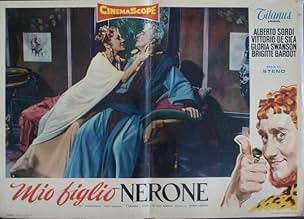Nero is on holiday at the seaside. Poppea, Seneca and many other guests are with him. Nero is preparing a great show where he will be the star. When Agrippina, his mother, arrives with her G... Read allNero is on holiday at the seaside. Poppea, Seneca and many other guests are with him. Nero is preparing a great show where he will be the star. When Agrippina, his mother, arrives with her German praetorians and decides Nero has to conquer Britain, she is asking for trouble. Many... Read allNero is on holiday at the seaside. Poppea, Seneca and many other guests are with him. Nero is preparing a great show where he will be the star. When Agrippina, his mother, arrives with her German praetorians and decides Nero has to conquer Britain, she is asking for trouble. Many attempts of murder and poisoning will happen on the eve of his great show.
- Ugolilla
- (as Agnese Dubini)
Featured reviews
Nero is normally used as a bad guy opposite a (comic) hero, but here he is himself at the centre of the story. Tension rises when his mother Agrippina visits him in his seaside villa and tries to coerce him into tending to state affairs. She has to rival with Seneca and Poppea who try to manipulate him in the opposite direction. The latter two try to have her murdered but she seems to be immortal. Meanwhile, Nero has taken to singing. An international cast in a unique comedy. I do not mean that it is an all-time masterpiece. Rather, it is a strangely factual comedy. The attempts at Agrippina's life are all taken literally from the writings of Suetonius. All they did was make it all happen in one weekend. Somehow, you get the feeling this is almost exactly what history was like.
The movie was dubbed in several languages. The German dub or the UK version are unavailable. The US version puts more emphasis on Poppea than on Agrippina, but what is worse, it is missing the final punchline - shame! Try the French or the Italian version, which are anyway the only ones available on DVD (as of 2010). English subtitles have appeared on the internet.
The insane situation of everybody plotting to kill each other was something that actually occured in the Roman Empire.
I have read many of the letters to Lucilius by Seneca the Younger, and I think this film gives a sharp, albeit slightly satircal, analysis of Seneca's character. In his letters he often writes about being happy while living in poverty and not needing luxury, but he himself lived a luxurious life as Nero's advisor. His philosophy is also pretty well incorporated as well as can be in a comedy.
Also the character of Nero is played well, and probably not even exaggerated, Nero was actually dangerously crazy and obsessed with performing music and theater.
Brigitte Bardot is gorgeous of course. According to Tacitus her character Poppaea did turn Nero against his mother Agrippina.
The scenery and stage of the film is also beautiful.
Besides, the film has an eclectic – and rather surprising – mix of talents, on both sides of the camera: in fact, it co-stars Vittorio De Sica (a great director but also a wonderful actor) as Seneca, Gloria Swanson (her renowned comeback in SUNSET BOULEVARD [1950], alas, didn't lead to much) as Agrippina – Nero's fearsome and domineering mother, Brigitte Bardot (on the verge of becoming an international sex symbol) as a rather ordinary-looking Poppea, and even future Hammer leading lady Barbara Shelley – though not in a prominent role, presumably, as one of the innumerable maidens at Nero's palace; and, then, there's horrormeisters Mario Bava and Lucio Fulci – here in the capacity of cinematographer and assistant director respectively!
The film manages to be quite engaging and stylish (no wonder, given Bava's involvement)…even if it was rather a chore to watch, since the Italian TV channel which showed it has been suffering from a horrendous reception for some time! The simple plot involves Agrippina's unannounced arrival at Nero's resting quarters to verify rumors of his liaison with Poppea; Seneca, Nero's adviser, is assigned by the Emperor the task of stalling her at every turn…even if he has to marry her to do so! Of course, Nero is eager to flaunt his alleged musical genius and the bevy of associates and conspirators enclosed within the palace boldly hisses or meekly applauds his would-be compositions; at the end, distressed by rejection (especially by those closest to him) leads him to set the empire's capital on fire...
Did you know
- TriviaFinal film of Agnese Dubbini.
- ConnectionsFeatured in Legendy mirovogo kino: Alberto Sordi
- How long is Nero's Mistress?Powered by Alexa
Details
- Release date
- Countries of origin
- Language
- Also known as
- Nero's Mistress
- Filming locations
- Production companies
- See more company credits at IMDbPro
- Runtime
- 1h 28m(88 min)
- Aspect ratio
- 2.35 : 1






























